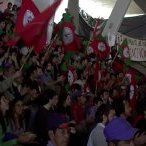
13 September 2010 | News | 1st Conference of the National Peasant and Indigenous Movement of Argentina | Food Sovereignty
“They know who we are”
Beginning of the First Conference of the National Peasant and Indigenous Movement from Argentina
Download: MP3 (1.7 Mb)
With musical performances at the Bakers Union in Buenos Aires Province, the First Conference of the National Peasant and Indigenous Movement of Argentina started on September 11.
This event, with over 1500 international delegates and participants is the result of a process of two decades of organized expressions and several landmarks to include issues important for peasants in the agenda of the country.
“We are the answer against doubt” said Susana Rosales from the Peasant Movement of Cordoba with reference to the long tradition of the national movement, member of La Via Campesina International and the Coordination of Rural Organizations (CLOC) of Latin America, in terms of food sovereignty, and solutions to hunger and climate change which have been systematically neglected by the authorities.
Angel Strappazzon, who works as international coordinator from Quimili in Santiago del Estero, said that throughout its history, the National Movement was able to stop tractors that were meant to destroy houses; the movement was able to expel big companies from farmlands; they could confront repression and come up with production and trade alternatives.
“Now they know who we are”, said Angel from a space occupied by peasant symbols: seeds, water, earth, flowers and fire, in addition to banners from the different organizations member of the Movement.
Another aim of the Conference is to “remember, dismantle and then rebuild our memories”, separating them from the vision according to which the poor people of the countryside are unproductive and a “hinder to progress”, said Angel.
Delegations from several countries of the region, such as Paraguay, Chile, Uruguay, the Landless Rural Movement of Brazil and international support groups from Catalonia and the Basque Country are participating in the event which is being carried out under the slogan “We are the land to feed people”. Angel said that peasant communities are extremely important since they provide healthy food to the populations and help preserve the territories”.
Also, there were several banners and posters to remember key people of the Latin American struggle for the rights of the people, among them Argentinean activist Dario Santillan, Azucena Villaflor, Augusto C. Sandino, Santucho, Brazilian educator Paulo Freire, Mexican Pancho Villa, Tupac Katari, among others.
Mocase member, Gringo Farias, asked “Where is the Mesa de Enlace, the murderers that have come to kill our native seeds? The Mesa de Enlace is a corporation of leaders from the main Argentinean associations of rural employers that are against Buenos Aires authorities due to tax withholdings to GM soy exports.
There is also a market with products from the territories brought by the different members of the Movement at the event. Hundreds of visitors, students, families and members of allied organizations such as Mothers and Grandmothers of Plaza de Mayo, visited the facility of the Union and talked to the rural workers.
There is also a tent, where men and women work cooking lunch, snacks and dinner for everyone, without asking where people come from. There are also commissions that work on political and internal documents of the National Movement, a Movement that represents a true space for the demands of people in a country characterized by political fragmentation.
On Tuesday 14, the event will be closed with a march from Puente Pueyrredon to Plaza de Mayo.
primer congreso mnci from RMR on Vimeo.







